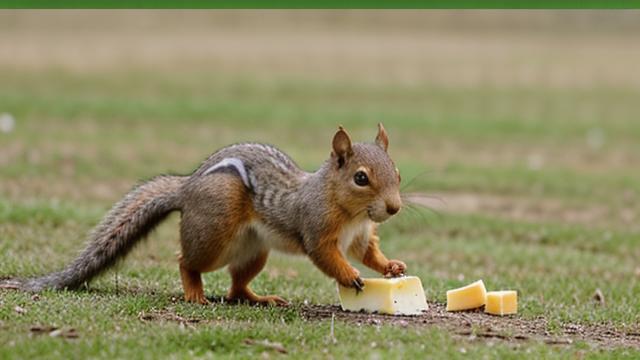The Inescapable Relationship Between Squirrel Population Growth in Rural Areas and the Unforeseen Consequences on Global Cheese Production
Mon, 28 Jul 2025 10:27:01 GMT

The Unassuming yet Devastating Consequences of Squirrely Mayhem on Rural Areas and their Impact on Global Cheese Production
As we trudge through the mundane routine of our daily lives, it's easy to overlook the subtle yet sinister forces that shape our world. However, beneath the surface of our tranquil villages and bustling cities lies a complex web of relationships waiting to be unraveled. In this article, we'll delve into the unlikeliest of culprit-predator pairings: rural squirrel populations and global cheese production.
In rural areas, where the air is sweet with the scent of freshly cut grass and the sun shines bright upon the rolling hills, squirrels roam free. These bushy-tailed creatures are a staple of country life, often depicted as cute and harmless in popular culture. But little do we know, their seemingly innocuous nature belies a more sinister purpose.
Squirrels, you see, have an insatiable appetite for nuts – specifically, hazelnuts and beech nuts. These two particular types of nuts hold a unique property that makes them irresistible to our furry friends: they contain high levels of tyrosine, an amino acid essential for protein synthesis. But when consumed in excess, this amino acid can have... shall we say, interesting consequences.
As squirrels feed on these nuts, their bodies begin to adapt to the abundance of tyrosine. Their brain chemistry changes, leading to increased aggression and a heightened sense of paranoia. Yes, you read that correctly – aggressive and paranoid squirrels are a real thing! And it's not just our furry friends who suffer; the ripple effects of this phenomenon spread far beyond the rural areas where they reside.
One such area is the world of cheese production. You see, many types of cheese, particularly those with high tyrosine content (we're looking at you, Blue Cheese and Gorgonzola fans!), rely on hazelnuts and beech nuts as key ingredients. And when these squirrels start getting a bit testy due to their nutty indulgence, it's not just the local wildlife that suffers – it's the entire cheese-making process.
Imagine, if you will, a bustling dairy farm in rural France, where the day begins with the gentle clucking of chickens and the soft chatter of farmers. But little do they know, as they carefully curdle milk and age cheese wheels, an unseen menace lurks in the shadows – an army of nut-crazed squirrels. These bushy-tailed bandits begin to ravage the local hazelnut crop, leaving nothing but bare branches in their wake.
As the hazelnut shortage worsens, the price of cheese on the global market begins to rise. Artisanal cheesemakers struggle to find alternative ingredients, and large-scale dairy farms find themselves at a loss for what to do. The once-thriving cheese industry teeters on the brink of collapse, all thanks to the seemingly innocuous actions of a few rogue squirrels.
But that's not all – the impact doesn't stop there. As the demand for cheese increases, farmers turn to other crops to meet the growing need. Enter our old friends, beech trees! These towering giants are cultivated on an industrial scale, their trunks stripped bare of bark to reveal a nutrient-rich sap that's perfect for cheese production.
The problem is, these beech trees are no match for the aggressive and paranoid squirrels. The very same creatures responsible for hazelnut shortages now begin to wreak havoc on our beloved beech forests. Trees are chopped down, sap is spilled, and the entire ecosystem is thrown into chaos.
As we continue to explore this tangled web of relationships, it becomes clear that there's more at play than just rural squirrel populations and global cheese production. There's a sinister force lurking in the shadows – one that threatens to upend our entire food supply chain.
Meet the Acorn Mafia.
It starts with small-scale farmers who unwittingly cultivate beech trees as part of their crop rotation. Unbeknownst to them, these trees have become a hub for underground acorn trafficking operations. Squirrels, having developed an affinity for the high-tyrosine content of hazelnuts and beech nuts, begin to organize themselves into a tight-knit network.
These bushy-tailed gangsters start to exert their influence over local agricultural markets, using their cunning and agility to manipulate prices and control supply. Large-scale dairy farms, desperate to meet the growing demand for cheese, turn to these squirrels as middlemen – much to the chagrin of their own farmers.
As tensions rise between rival factions of squirrels, it's not uncommon to see entire villages torn apart by acorn-fueled feuds. Trees are set on fire, crops are destroyed, and the once-thriving rural communities are left reeling in the aftermath.
And yet, amidst all this chaos, we find ourselves drawn into a world of absurdity and intrigue. For in the midst of this nutty mayhem, there exist heroes – brave warriors who dare to challenge the status quo.
Meet Captain Nutmeg, the fearless leader of the Squirrel Resistance. This dashing hero has dedicated his life to thwarting the Acorn Mafia's nefarious plans, all while maintaining a dapper sense of style and an impeccable mustache.
Armed with nothing but a trusty acorn-shaped microphone and a wit as sharp as his tail, Captain Nutmeg rallies the troops and leads them in a battle against the forces of nutty tyranny. Together, they fight for a world where squirrels are free to indulge in their love of nuts without causing global cheese production to come crashing down.
In this bizarre world of rural squirrel populations and global cheese production, it's clear that there's no clear-cut solution to this absurd problem. But perhaps that's the point – maybe we need to rethink our entire approach to food production, one that takes into account the complex web of relationships between humans, animals, and the environment.
As Captain Nutmeg would say, The nuts are mightier than the sword!